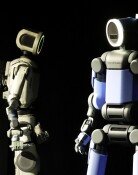I Dont Know Where We Are
Renowned writer Yi Mun-yeol gave a lecture about Koreas ideological map at the Marriott Hotel in Washington upon the invitation of Seoul National University Alumni Association.
In the lecture with an audience of some 200 people, he criticized Koreas conservatives as well as the current administration. He also raised some unique questions about the new college entrance system during the question and answer session.
The following is excerpted from his lecture and the question and answer session.
- The way Koreas real powers interpret world politics reveals their open anti-Americanism and pro-China sentiment. In Korea, things which would have shocked the public 20 years ago now happen casually. Recently, a group of protesters in the city of Gwangju demanded the withdrawal of a Patriot missile base, which was constructed to defend ourselves against North Koreas missile attacks. The demonstration was intense, but the police did not arrest a single protester. I dont know where we are now.
- Some conservatives made costly slips of the tongue recently. One said the Korea-Japan annexation was a blessing. He later explained that his remark was exaggerated and what he meant was it was fortunate that we were colonized by Japan, not Russia. Still, the word blessing is a queer choice. When I saw another conservative critic say why comfort women would come out on the street when they should bite their tongues and kill themselves, I thought there are many insane people out there.
- Some cautious people say, Did we experience a revolution without knowing it? and some cynics sarcastically say, Now as the communization is over, unification is next.
- One of the reasons for pessimism is that many of those who oppose to the current administration have a factional belief. What makes us even gloomier is there is no alternative right-wing group. We have the New Right movement and groups named someones samo which support a particular persons ideology, but they are insufficient to be an alternative. Samo is an imitation of Nosamo, a support group of president Roh. And imitations cannot defeat the genuine article.
Q: Do you think that the hundred thousand protesters who gathered at the candlelight demonstration for Hyo-sun and Mi-sun [those who were killed by an armored car driven by U.S. soldiers] are pro-communist elements?
A: [Pro-communist elements] would number two to three thousand at most. We should be careful and confine the expression to those who have a connection with and receive funding or instructions from North Korea. Otherwise, that would be regarded as ridiculous in todays Korea.
Q: What do you think of the argument that Seoul National University should be closed down?
A: It sounds like a kind of anti-intellectualism, rather than a stand against academic connections. According to the education ministrys new plan, college entrance will depend on ones school record, and ones school record depends on teachers. The education authority is no longer in the hands of principals or chief directors of schools, but of teachers. If these teachers are imbued with a particular ideology, the college entrance system in Korea will be like that of North Korea where only those who are loyal to the communist party can go to the privileged universities. I am concerned if students are not assessed on their academic achievements and if those students who received good grades by teachers who have a particular ideology go to the best colleges.
Soon-Taek Kwon maypole@donga.com






![[단독]“권성동, ‘王’자 노리개 등 장식 상자 2개로 1억 받았다”](https://dimg.donga.com/c/138/175/90/1/wps/NEWS/IMAGE/2026/01/22/133211754.1.jpg)
